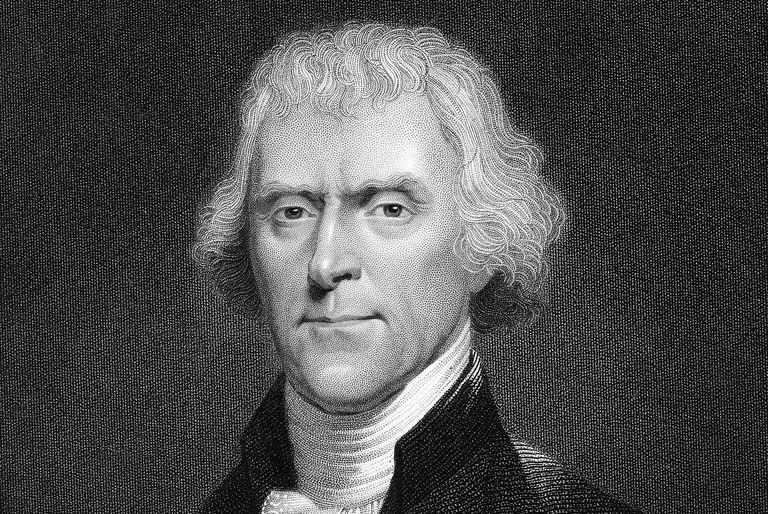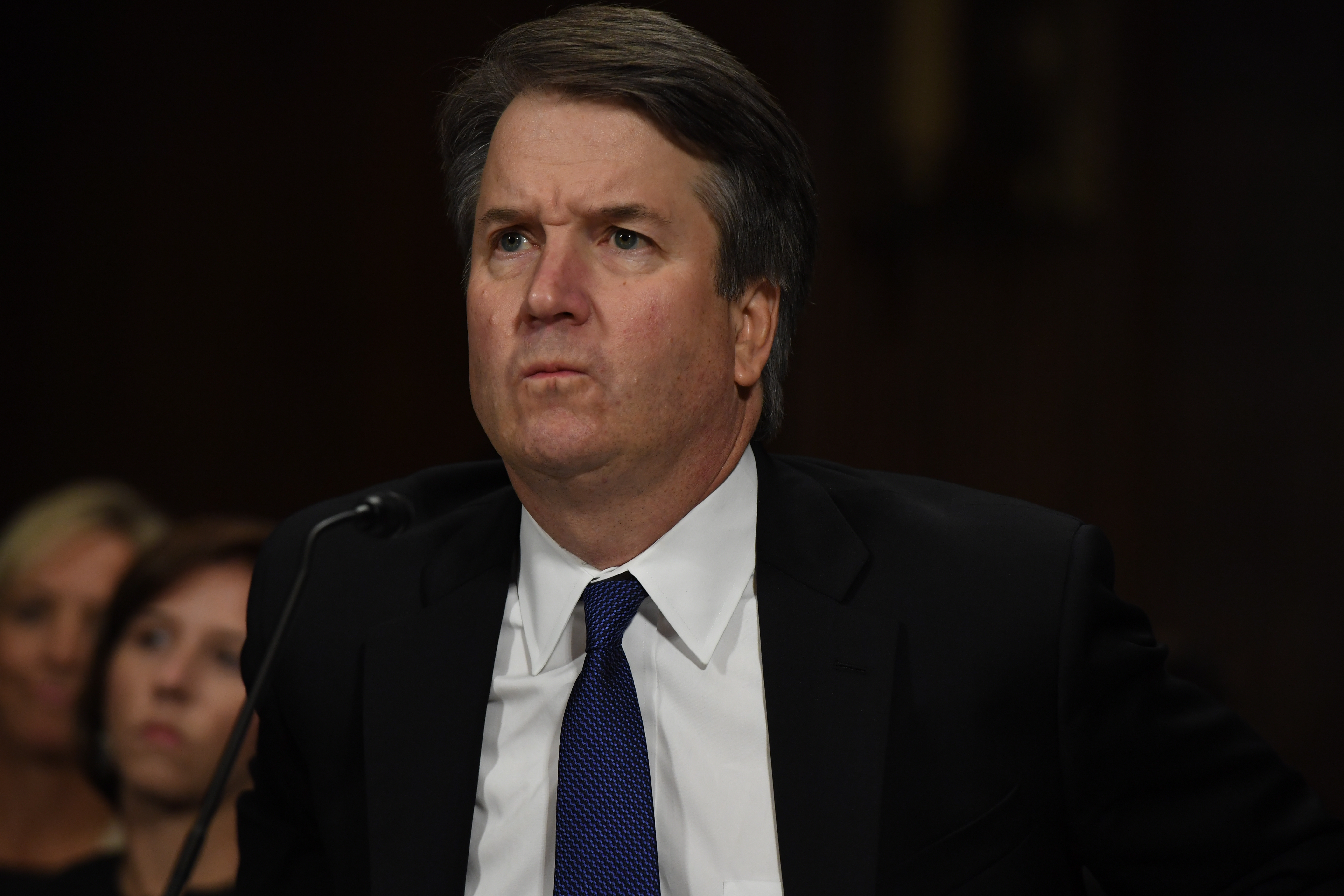Partisan politics and Kavanaugh’s defiant words
show Jefferson was right about Supreme Court

Supreme Court nominee Brett M. Kavanaugh appeared before the Senate Judiciary Committee on Sept. 27, and adamantly denied Christine Blasey Ford's allegation of sexual assault. (Jenny Starrs /The Washington Post)
The Senate’s take-no-prisoners partisan warfare over U.S. Appeals Court Judge Brett M. Kavanaugh’s Supreme Court nomination and Kavanaugh’s own decidedly injudicious denunciations of his political enemies have placed the court in an unwelcome spotlight as it begins a new term Monday.
The political underpinnings of the court — conservative justices nominated by Republican presidents, liberal ones named by Democrats — are never far from the surface. But justices on both sides strive to pretend, at least in public, that ideological rather than partisan concerns account for their disagreements.
The open warfare over Kavanaugh has left the court with more than just an empty chair at the end of the bench.
“After this, public perception is going to increasingly be that it’s more a political body than a judicial one,” said Benjamin Barton, a law professor at the University of Tennessee who studies the federal judiciary. “To me, this will be a disaster for them.”
Added Jonathan Peters, a media law professor at the University of Georgia. “The court is a political institution, yes, but as much as possible it’s critical for the justices to pretend to be — and be regarded as — impartial, trustworthy and above the political fray, to the dumb masses of Americans. The justices have reason now to be concerned.”

U.S. Supreme Court nominee Brett M. Kavanaugh takes a seat before a Senate Judiciary
Committee hearing Thursday on Capitol Hill. (Matt McClain/Pool/The Washington Post)
Supreme Court Justice Elena Kagan said as much late last week at an appearance at the UCLA School of Law. She steadfastly stayed away from questions about Kavanaugh, but she worried about public perception, saying:
The court’s strength as an institution of American governance depends on people believing it has a certain kind of legitimacy — on people believing it’s not simply just an extension of politics, that its decision-making has a kind of integrity to it. If people don’t believe that, they have no reason to accept what the court does.”
Kavanaugh, a 12-year veteran of the U.S. Court of Appeals for the D.C. Circuit, rejected attempts to paint him as a political warrior in his first appearances before the Senate Judiciary Committee. “The Supreme Court must never be viewed as a partisan institution,” he said. But he came out swinging Thursday with his nomination hanging in the balance, saying what will probably be the enduring sound bite of the hearing:
This whole two-week effort has been a calculated and orchestrated political hit fueled with apparent pent-up anger about President Trump and the 2016 election, fear that has been unfairly stoked about my judicial record, revenge on behalf of the Clintons, and millions of dollars in money from outside left-wing opposition groups.
President Trump immediately graded his nominee’s work, calling his words “powerful, honest and riveting.” He added in his tweet: “Democrats’ search and destroy strategy is disgraceful and this process has been a total sham and effort to delay, obstruct, and resist.”
Other Kavanaugh supporters said the judge’s raw 45-minute opening statement was exactly what should be expected from a man who felt his entire career was being undermined by uncorroborated allegations encouraged by Democrats and liberal interest groups intent on keeping him off the court.
“Senators have a choice: endorse a smear campaign or support Judge Kavanaugh,” said Carrie Severino of the Judicial Crisis Network, a key group supporting the nomination.
Historians will note that this partisan pallor over the politically appointed court is not new at all. Thomas Jefferson wrote about this problem when the US Constitution was first proposed. Later, Jefferson wrote scathing critiques of the Supreme Court after it upheld the blatantly unconstitutional Alien and Sedition Acts. He favored states nullifying those laws, and wrote the Kentucky Resolution in protest (anonymously since he was vice president at the time.)
[John Marshall’s] twistifications in the case of Marbury, in that of Burr, & the late Yazoo case, shew how dexterously he can reconcile law to his personal biasses.Jefferson’s view was that if the Founding Fathers had wanted to give the Supreme Court the power of judicial review, they would have written that power into the Constitution in 1787. He regarded Marshall’s power-grubbing decision in Marbury v. Madison as a kind of silent junta that overthrew the clear intentions of the Constitution. Jefferson was right, as the course of history has shown.
— Jefferson letter to James Madison, March 5, 1810
If [as the Federalists say] “the judiciary is the last resort in relation to the other departments of the government,” … , then indeed is our Constitution a complete felo de so. … The Constitution, on this hypothesis, is a mere thing of wax in the hands of the judiciary, which they may twist and shape into any form they may please. It should be remembered, as an axiom of eternal truth in politics, that whatever power in any government is independent, is absolute also.
— Letter to Judge Spencer Roane, Nov. 1819
Jefferson was a genius, and saw clearly that judicial tyranny undermined the Constitution and all limitations of government power.
The judiciary of the United States is the subtle corps of sappers and miners constantly working underground to undermine our Constitution from a co-ordinate of a general and special government to a general supreme one alone. This will lay all things at their feet. … I will say, that “against this every man should raise his voice,” and, more, should uplift his arm.When partisans and mainstream media frame the current judicial circus as a new phenomena, they are clearly wrong, and rather ignorant of US history. A supreme court that can override state law and interpret the US Constitution in favor of the central State has always been controversial to those that value liberty.
— Letter to Thomas Ritchie, Sept. 1820
This is a Hogeye Bill remix of this lame WaPo article, made intelligent by adding Jefferson's thoughts.
